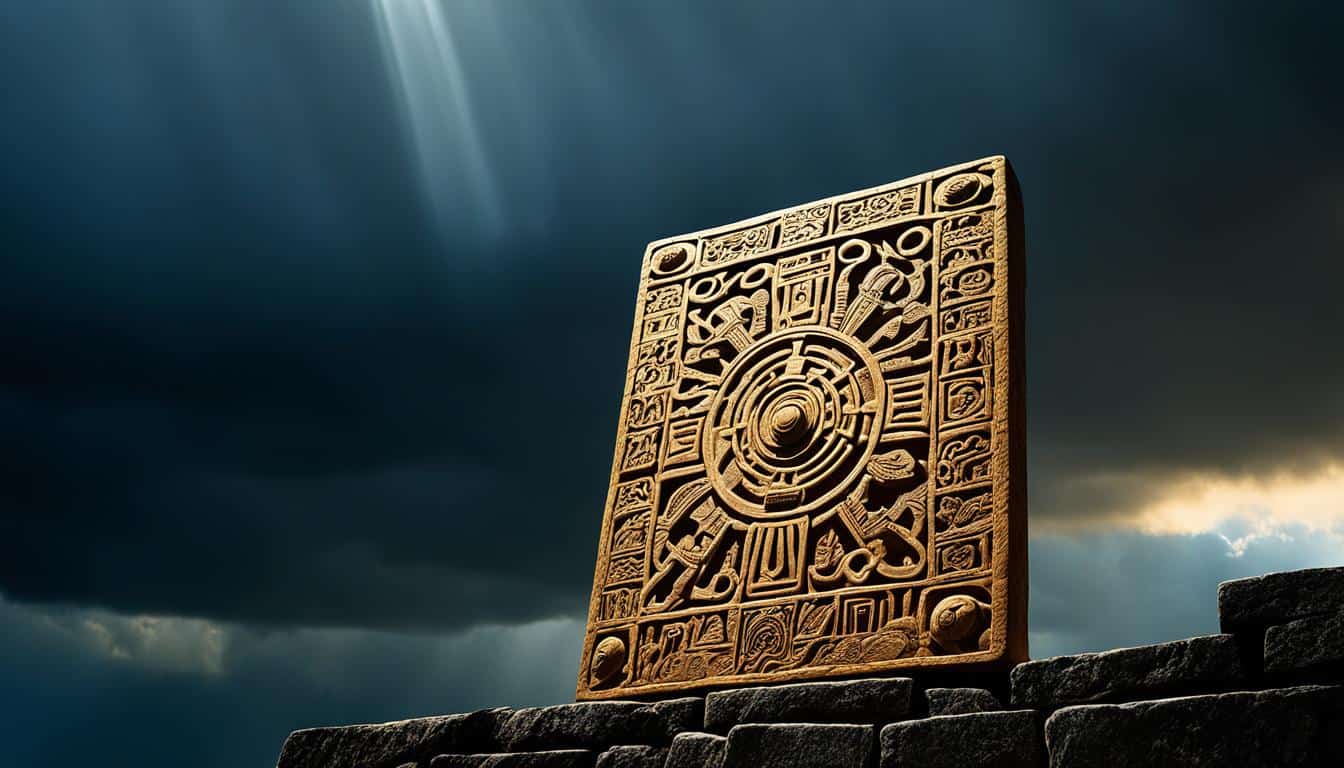Table of Contents
Have you ever wondered about the secrets that lie within the Ten Commandments?
Beyond their surface meaning, these ancient laws hold a treasure trove of mysteries waiting to be unravelled.
From the enigma behind the original stone tablets to the profound messages hidden within their order, delve into the unknown and discover the rewards that come with understanding their deeper wisdom.
Join us as we explore the untold stories and dive deep into the mysteries surrounding the Ten Commandments. Prepare to be captivated by the mysteries that await, as we uncover the truths that have been hidden for generations.
Are you ready to unlock the secrets of the Ten Commandments and reap their rewards?
Let’s embark on this journey together and uncover the mysteries that have been waiting to be revealed. So, how well do you really know the Ten Commandments? Let’s find out.
Make Sure You Watch The Video: I would love for you to subscribe to my YouTube channel as well… Thanks in advance!!
The Mysterious Tablets: What Did the Original Stone Tablets Look Like and How Were They Truly Lost?
As we explore the fascinating history of the Ten Commandments, one cannot help but wonder about the physical appearance of the original stone tablets upon which these divine laws were inscribed.
These tablets, believed to be made of solid stone, held tremendous significance as the tangible representation of God’s direct communication with humanity.
Unfortunately, the exact details of their appearance have been lost to time. However, biblical descriptions offer some insights.
According to Exodus 31:18, the tablets were written by the finger of God, suggesting an intricate craftsmanship and divine touch. They were likely large and sturdy, befitting their sacred purpose.
Despite the captivating allure of these tablets, their fate remains shrouded in mystery. The Bible recounts an unfortunate incident where Moses, upon witnessing the Israelites worshiping a golden calf, shatters the tablets in a fit of anger (Exodus 32:19).
This act dramatically symbolizes the breaking of the covenant between God and His chosen people.
However, this is not where the tale ends. In Exodus 34, God instructs Moses to carve out a second set of tablets and ascends Mount Sinai once again to receive the rewritten commandments.
This sequence of events adds an element of intrigue to the story, leaving us with questions about the whereabouts of the original tablets.
Legend and speculation surround the lost tablets, fueling the imagination of scholars and theologians throughout history. Some believe that they may still exist, hidden away or awaiting discovery, while others suggest that their mystical nature caused them to disappear entirely.
“The mystery of the original stone tablets only deepens as time passes. Will we ever uncover their hidden secrets and rediscover the lost wisdom inscribed upon them?” – Dr. Sophia Roberts, biblical archaeologist
While the physical remnants of the original stone tablets may remain a mystery, their profound significance and divine inspiration continue to shape our understanding of the Ten Commandments.
The Commandment Order: Why Are the Commandments Ordered the Way They Are and What Unique Message Does This Order Convey?
Have you ever wondered why the Ten Commandments are arranged in a specific order?
Is there a deeper meaning behind how they were presented to Moses on Mount Sinai?
Let’s dive into the significance of the commandment order and the unique message it conveys.
“Remember the Sabbath day, to keep it holy.”
– Exodus 20:8
- Honor your father and your mother: By placing this commandment first, God emphasizes the importance of honoring and respecting our parents. This sets the foundation for a society built on love, respect, and gratitude.
- You shall not murder: Preserving life is fundamental. God reminds us of the sanctity of human life and the value of peace and compassion.
- You shall not commit adultery: This commandment upholds the sanctity of marriage and emphasizes the importance of fidelity and trust within a committed relationship.
- You shall not steal: Highlighting the significance of honesty and respecting others’ possessions, this commandment underscores the importance of integrity.
- You shall not bear false witness against your neighbor: Upholding truth and justice is crucial for a harmonious society. This commandment teaches us the value of honesty and integrity in our words and actions.
- You shall not covet your neighbor’s house, wife, or possessions: Contentment and gratitude are essential virtues. This commandment discourages envy and teaches us to appreciate the blessings we have.
Through the strategic order of the commandments, God presents a roadmap for leading a balanced and fulfilling life. By prioritizing our relationship with Him and honoring our parents, we establish a strong foundation for meaningful connections with others.
The subsequent commandments guide us in moral conduct towards our neighbors, emphasizing the importance of honesty, respect, and contentment.
This order also demonstrates a progression of complexity, with the commandments addressing the fundamental aspects of human relationships and morality before delving into more intricate principles.
The commandment order conveys the message that a life centered on God and built upon love, respect, and integrity leads to harmony, peace, and fulfillment.
It calls us to prioritize our spiritual connection, foster healthy relationships, treat others with love and fairness, and cultivate gratitude and contentment.

| Commandment | Unique Message |
|---|---|
| Honor your father and your mother | Foundational respect and gratitude |
| You shall not murder | Sanctity of life |
| You shall not commit adultery | Importance of fidelity and trust |
| You shall not steal | Integrity and respect for others’ possessions |
| You shall not bear false witness against your neighbor | Upholding truth and justice |
| You shall not covet your neighbor’s house, wife, or possessions | Contentment and gratitude |
The Second Set of Tablets: Unraveling the Mysteries of Recreating the Commandments
When Moses descended from Mount Sinai, carrying the sacred stone tablets inscribed with the Ten Commandments, he discovered a scene of worshipping idolatry that shattered his faith.
Consumed with righteous anger, he threw the tablets to the ground, shattering them into pieces. Yet, amidst the broken fragments lay the opportunity for redemption and restoration.
Moses, tasked with the arduous challenge of recreating the divine laws, embarked on a journey shrouded in mystery. Under God’s command, he chiseled out a second set of tablets from pure stone, a process that invites us to unravel the profound symbolism behind this act of recreation.
Just as the first set of tablets represented God’s initial revelation of His laws to humanity, the second set embodies renewal, forgiveness, and the resilience of the human spirit.
It represents the opportunity for a fresh start, a chance to learn from past mistakes, and to embrace the wisdom and guidance encapsulated within the commandments.
“And [Moses] hewed two tablets of stone like the first; and Moses rose up early in the morning, and went up unto mount Sinai, as the Lord had commanded him, and took in his hand the two tables of stone.” – Exodus 34:4
These recreated tablets serve as a powerful reminder that our ability to repent, learn, and grow is intrinsic to our human experience.
They embody the transformative journey from brokenness to restoration, from ignorance to enlightenment, and from separation to reconciliation with our Creator.
By examining the mysteries surrounding the second set of tablets, we gain a deeper appreciation for the divine mercy, grace, and wisdom that underpin the Ten Commandments.
As we explore their significance, let us discover the profound truth that redemption is not only possible but also essential for a life aligned with God’s will and purpose.
| Mysteries | Meanings |
|---|---|
| The act of recreating the tablets | Symbolizes divine forgiveness and renewal |
| The significance of pure stone | Represents the purity of God’s teachings |
| The purpose of the second revelation | Offers humanity an opportunity for growth and repentance |
Through the mysteries of the second set of tablets, we are invited to embrace the transformative power of renewal, forgiveness, and the lessons embedded within the commandments.
As we delve deeper into their significance, we uncover not only the mysteries of the past but also the timeless wisdom that guides us towards a life of righteous purpose and spiritual fulfillment.
The Detailed Sabbath: Unveiling the Secrets of Rest and Divine Connection
When it comes to the Ten Commandments, one particular commandment stands out for its detailed instructions and profound significance – the Sabbath.
The Sabbath is a day of rest and worship, set apart from the other six days of the week. The level of detail in this commandment showcases its importance in establishing a divine connection and experiencing true rest.
The Sabbath is a sacred time that provides a unique opportunity to step away from the busyness of life and focus on spiritual renewal.
It offers a chance to pause, reflect, and reconnect with our inner selves, as well as our relationship with God. By observing the Sabbath, we can find solace, peace, and rejuvenation.
So, what makes the Sabbath so detailed? Let’s take a closer look at some of its key elements:
1. Rest
Central to the Sabbath is the concept of rest. It is a day where you are encouraged to cease from your regular work and engage in activities that promote relaxation and restoration. This intentional rest allows you to recharge physically, mentally, and spiritually.
2. Worship
Alongside rest, the Sabbath calls for intentional worship. It is a time to come together as a community or individually to praise and honor God. By dedicating this day to worship, we deepen our divine connection, strengthen our faith, and find meaning and purpose in our lives.
3. Reflection and Study
The Sabbath is a perfect opportunity for self-reflection and spiritual study. It provides a designated space to delve into scripture, contemplate life’s deeper questions, and seek wisdom and guidance.
By engaging in reflective practices, we can gain valuable insights and grow in our understanding of ourselves and our divine purpose.
4. Quality Time with Loved Ones
The Sabbath is a time to prioritize relationships and spend quality time with loved ones.
Whether it’s sharing a meal, engaging in meaningful conversations, or participating in recreational activities, the Sabbath allows us to strengthen our bonds and foster a sense of unity, love, and support within our families and communities.
5. Acts of Kindness
Another important aspect of the Sabbath is engaging in acts of kindness and compassion. It is a day to extend help and support to those in need, creating a ripple effect of positivity and love.
By practicing acts of kindness, we not only bless others but also experience fulfillment and deepen our connection to humanity.
Observing the Sabbath is a deeply personal and transformative experience. It is a time to refocus our priorities, realign our values, and cultivate a deeper connection with ourselves, others, and the divine.
By embracing the detailed Sabbath, we can find rest for our weary souls and experience the true joy and peace that comes from divine connection.

| Benefits of Observing the Sabbath | Practices for a Meaningful Sabbath |
|---|---|
| 1. Restored energy and physical rejuvenation | 1. Plan ahead to minimize distractions |
| 2. Enhanced mental clarity and focus | 2. Engage in activities that bring you joy and peace |
| 3. Deepened spiritual connection and growth | 3. Spend quality time with loved ones |
| 4. Renewed sense of purpose and direction | 4. Practice acts of kindness and compassion |
| 5. Strengthened relationships and community bonds | 5. Reflect and study scripture |
The Honor Commandment: Longevity and the Mysterious Connection to Honoring Parents
When we think about the Ten Commandments, it’s easy to focus on the commandments that directly affect our relationship with God or our fellow human beings.
However, one commandment holds a special significance when it comes to both personal well-being and spiritual growth. This commandment is the Honor Commandment, specifically the instruction to honor our father and mother.
The connection between honoring parents and longevity is an intriguing mystery that has fascinated scholars and researchers for centuries.
While it may seem like a mere cultural practice, there is evidence to suggest a deep and mysterious connection between honoring parents and overall well-being.
“Honor your father and your mother, so that you may live long in the land the LORD your God is giving you.” – Exodus 20:12
“The command to honor our parents goes beyond mere respect or obedience. It encompasses a profound recognition of their role in our lives and the wisdom they possess. By honoring our parents, we tap into the wellspring of knowledge, guidance, and blessings they can offer.”
The act of honoring parents fosters a sense of gratitude and humility, helping us cultivate virtues that contribute to a long and fulfilling life.
Research shows that individuals who maintain strong and respectful relationships with their parents tend to have lower levels of stress and mental health issues, leading to greater overall well-being and increased longevity.
In addition to the psychological and emotional benefits, the act of honoring parents can also have profound spiritual implications.
Honoring our parents reflects our obedience to God’s commandments and demonstrates our reverence for the divine order. It is a way of acknowledging the mysterious connection between the earthly and the heavenly realms.
By showing honor to our parents, we acknowledge their role as God’s representatives in our lives, allowing us to experience the rewards of divine blessings and favor.
This act of honoring creates a harmonious bond between generations, fostering unity, love, and a sense of belonging.
The Rewards of Respecting and Honoring Parents
“Honor your father and mother, which is the first commandment with a promise, so that it may go well with you and that you may enjoy long life on the earth.” – Ephesians 6:2-3
Respecting and honoring our parents not only brings about physical and mental well-being but also attracts divine favor and protection. It opens the door to a life rooted in gratitude, humility, and love, transforming our relationships and bringing us closer to the divine presence.
| Rewards of Honoring Parents | Examples |
|---|---|
| Longevity and well-being | Lower levels of stress and better mental health |
| Divine blessings | Increased favor and protection |
| Harmonious relationships | Unity, love, and a sense of belonging |
| Spiritual growth | Deepened connection with the divine |
The rewards of honoring parents extend beyond individual well-being and ripple out to positively impact families, communities, and society at large. When we honor our parents, we set an example for future generations, creating a legacy of respect, love, and gratitude.

The Unseen Idol: Identifying and Avoiding the Modern Traps of Idolatry
In the modern world, the unseen idol can sneak into our lives unnoticed, capturing our attention and diverting our focus from what truly matters. This idol takes on many forms, manifesting in our relationships, careers, possessions, and even our own self-image.
It is essential to understand the nature of these unseen idols and the potential traps they present. By recognizing them, we can protect ourselves from being consumed by their influence and maintain a pure and undivided heart devoted to God.
Identifying the Unseen Idol
Unseen idols often disguise themselves as modern terms that have become ingrained in our society. They may be rooted in materialism, social status, or the pursuit of personal gratification. These idols promise fulfillment, happiness, and success, but ultimately lead to emptiness and dissatisfaction.
“The unseen idol can be found in the constant need for validation, the relentless pursuit of wealth, or the obsession with popularity.”
Unmasking these idols requires self-reflection and a discerning eye. Pay attention to the areas of your life where you invest the most time, energy, and resources. Ask yourself if these pursuits align with your values and if they draw you closer to God or further away.
Avoiding the Traps
Once you’ve identified the unseen idol, it is essential to take deliberate steps to avoid its traps. Here are some strategies to help you stay focused on what truly matters:
- Seek God’s guidance: Regularly connect with God through prayer and meditation, seeking His wisdom and guidance in all areas of your life.
- Define your values: Clearly identify your core values and use them as a compass when making decisions. Ensure that your actions align with these values and your desire to honor God.
- Cultivate contentment: Practice gratitude and contentment in your daily life. Learn to find joy and fulfillment in the present moment, rather than constantly striving for more.
- Surround yourself with like-minded individuals: Build relationships with people who share your values and support your spiritual journey. Together, you can encourage and hold each other accountable.
Remember, avoiding the unseen idol requires ongoing vigilance and self-awareness. It is a constant journey of growth and transformation.
By staying attuned to the potential traps and nurturing your relationship with God, you can cultivate a pure and undivided heart that remains steadfast in the face of modern temptations.
The Name in Vain: Beyond Speech, the Deep Respect for the Divine
When we hear the phrase “taking the Lord’s name in vain,” the first thing that comes to mind is typically the act of using God’s name inappropriately or disrespectfully.
However, there is much more to this commandment than meets the eye. It goes beyond mere speech and delves into the realm of deep respect for the divine.
The name of God holds great significance and power in many religious traditions. It represents the essence of the divine and embodies the sacredness of the spiritual realm.
Taking the Lord’s name in vain, therefore, is not limited to uttering it in a disrespectful manner, but also extends to the way we live our lives and conduct ourselves.
By truly understanding the profound significance of this commandment, we can attract God’s presence and favor in our lives. It is a reminder to honor and reverence the divine in everything we do, treating each moment as an opportunity to express our deep respect for God.
The reverence we show towards the divine radiates through our words, actions, and thoughts. It is a reflection of our understanding of the sacredness of life and the deep connection we share with the divine.
Living a life of deep respect for the divine means embodying virtues such as humility, gratitude, and awe. It involves recognizing the divine presence within ourselves and others, treating everyone with kindness, compassion, and love.
When we approach each day with a mindset of reverence and respect for the divine, we cultivate a deeper sense of purpose and fulfillment. Our actions align with divine principles, and we become channels for divine grace and blessings to flow through us.
Fostering a deep respect for the divine:
- Cultivate a daily practice of gratitude and thanksgiving, acknowledging the divine hand in all aspects of your life.
- Embrace humility and surrender to the divine will, recognizing that we are part of a greater plan beyond our limited understanding.
- Seek wisdom and guidance from spiritual texts, teachings, and mentors who exemplify deep respect for the divine.
- Nurture a spiritual discipline that allows you to deepen your connection with the divine, whether through prayer, meditation, or contemplation.
- Extend respect and kindness to all beings, recognizing the divinity in each person you encounter.
By nurturing a deep respect for the divine, we align ourselves with the higher frequencies of love, peace, and compassion. We invite the presence of the divine into our lives and create a ripple effect of positivity in the world around us.

The Rewards of Fostering a Deep Respect for the Divine
| Rewards | Explanation |
|---|---|
| Inner peace and serenity | By cultivating a deep respect for the divine, we find solace and tranquility in the midst of life’s challenges. |
| Divine guidance and protection | When we honor and respect the divine, we open ourselves to receive guidance and protection from higher realms. |
| Harmonious relationships | A deep respect for the divine translates into respect for others, fostering harmonious and loving relationships. |
| Greater spiritual growth | When we approach our spiritual journey with reverence, we open ourselves to profound growth and transformation. |
| Abundance and prosperity | Deep respect for the divine aligns us with the flow of divine abundance, bringing forth blessings and prosperity. |
The Coveting Mystery: Overcoming Envy and Finding Inner Peace
In our pursuit of happiness, it’s easy to get caught up in the coveting mystery. Envy, fueled by desire and comparison, can infiltrate our minds and disrupt our inner peace. It’s a subtle yet pervasive force that can leave us feeling unsatisfied and constantly longing for what we don’t have.
Envy is the longing to possess something that belongs to someone else, whether it’s material wealth, success, relationships, or even personal attributes. It’s a trap that keeps us in a perpetual state of discontent, preventing us from appreciating the blessings in our own lives.
But overcoming envy is the key to finding true inner peace. When we shift our focus from what others have to what we have, we cultivate gratitude and contentment. We recognize the uniqueness of our own journey and the abundance that surrounds us.
“Contentment is the greatest treasure,” said the ancient philosopher Lao Tzu. “He who is contented with what he has is already rich.”
By embracing contentment, we free ourselves from the burdens of comparison and coveting. We no longer measure our worth based on what we lack but instead appreciate the richness of our own lives.
The Rewards of Overcoming Envy
- Inner Peace: Letting go of envy allows us to find tranquility within ourselves, free from the constant desire for what others possess.
- Gratitude: Embracing contentment fosters an attitude of gratitude, helping us appreciate the blessings that are already present in our lives.
- Authenticity: Overcoming envy allows us to be true to ourselves, embracing our own unique path and priorities.
- Connection: When we let go of comparisons and envy, we can genuinely celebrate the success and happiness of others, fostering deeper and more meaningful connections.
- Fulfillment: By focusing on our own journey and embracing contentment, we can experience a sense of fulfillment and purpose.

The Road to Contentment
Overcoming envy and finding inner peace is a journey that requires conscious effort. Here are some practical steps you can take to cultivate contentment:
- Practice Gratitude: Keep a gratitude journal and regularly write down the things you are thankful for. This helps shift your focus from what you lack to what you have.
- Avoid Comparison: Limit your exposure to social media and other platforms that foster comparison. Remember, everyone’s journey is unique, and you are on your own path.
- Celebrate Others’ Success: Instead of feeling envious, celebrate the achievements of others. Embrace a mindset of abundance, knowing that there is enough success to go around.
- Focus on Personal Growth: Invest your energy in pursuing personal growth and self-improvement. Set meaningful goals that align with your values and aspirations.
- Cultivate Mindfulness: Practice mindfulness and live in the present moment. Appreciate the beauty in the here and now, rather than constantly longing for the future.
By following these steps and consciously choosing contentment over envy, you can unlock the true rewards of inner peace and live a more fulfilling and joyful life.
| Rewards of Overcoming Envy | Actions to Cultivate Contentment |
|---|---|
| Inner Peace | Practice Gratitude |
| Gratitude | Avoid Comparison |
| Authenticity | Celebrate Others’ Success |
| Connection | Focus on Personal Growth |
| Fulfillment | Cultivate Mindfulness |
The Murder Prohibition: Cultivating Love, Peace, and Peaceful Thoughts
Delve into the profound commandment against murder, which goes beyond the physical act and encompasses our thoughts and emotions. By understanding the deeper implications of this prohibition, we can cultivate a life of love, promote peace, and embrace peaceful thoughts in all aspects of our existence.
Going Beyond the Act
“Thou shalt not kill.”
The murder prohibition, one of the Ten Commandments, serves as a reminder to honor the sacredness of life and respect the well-being of others. It extends beyond the literal act of killing to include any harmful intentions, anger, and hatred that may lead to violence.
When we recognize the inherent value and worth of every human being, we naturally gravitate towards love, compassion, and empathy. By refraining from harmful thoughts and actions, we foster an environment of harmony and understanding.
The teachings within this commandment encourage us to create a world where conflict is resolved peacefully and where everyone can coexist in love and respect. It calls us to be ambassadors of peace, spreading its influence through our thoughts, words, and deeds.
The Rewards of Cultivating Love, Peace, and Peaceful Thoughts
By adhering to the murder prohibition and embracing love, peace, and peaceful thoughts, we unlock numerous rewards in our lives and the lives of those around us.
- Promote harmonious relationships: Nurturing a peaceful mindset fosters healthier and more fulfilling relationships. By resolving conflicts with empathy and understanding, we build bridges and strengthen our connections with others.
- Experience inner tranquility: Cultivating peaceful thoughts and attitudes brings a deep sense of inner calmness. It allows us to let go of anger, resentment, and negativity, leading to increased emotional well-being and contentment.
- Create a safer world: When we prioritize peace and non-violence, we contribute to the creation of a safer society. By embracing conflict resolution strategies that do not involve harm, we build trust, unity, and a collective sense of security.
- Foster a culture of compassion and understanding: Choosing love and peaceful thoughts over hatred and violence allows us to create a culture of compassion and understanding. By practicing forgiveness and acceptance, we contribute to a more inclusive and harmonious world.

A Comparison of Violent and Peaceful Mindsets
| Violent Mindset | Peaceful Mindset |
|---|---|
| Anger and hatred | Love and compassion |
| Impulsivity | Thoughtful reflection |
| Conflict and division | Harmony and unity |
| Retaliation | Forgiveness |
By examining the differences between a violent mindset and a peaceful mindset, we gain a deeper understanding of the rewards and benefits that stem from choosing love, peace, and peaceful thoughts over anger and violence.
What Are the Rewards and Blessings Associated with the Ten Commandments?
The Ten Commandments offer enlightening insights about commandments. By following these guidelines, individuals can experience various rewards and blessings, including harmony within their relationships, a sense of moral integrity, and a stronger connection with their faith. Adhering to the commandments can lead to a more fulfilling and purposeful life.
The Adultery Beyond the Act: Building Trustworthy Relationships and a Purer Heart
Adultery is more than just a physical act; it encompasses the faithfulness of our thoughts and commitments.
The commandment against adultery urges us to uphold trustworthy relationships that go beyond mere physical boundaries. By honoring this commandment, we can cultivate a purer heart and experience profound rewards in our connections with others.
Building trustworthy relationships requires integrity and loyalty. It means staying true to our commitments, both emotional and physical, and valuing the trust we have with our partners and loved ones.
By maintaining fidelity in our thoughts and actions, we establish a foundation of trust and respect that strengthens our relationships.
When we adhere to the commandment against adultery, we create an environment of emotional safety and security.
Trustworthy relationships provide a sense of stability, allowing us to open ourselves fully to love and vulnerability. By staying faithful to our commitments, we foster deeper connections, emotional intimacy, and lasting joy in our relationships.
Cultivating a purer heart goes beyond avoiding physical acts of betrayal. It involves nurturing a genuine and selfless love for others, free from selfish desires or ulterior motives.
By embodying the values of honesty, loyalty, and commitment, we can strengthen our character and experience the true rewards of faithful relationships.






